Ofqual chair Ian Bauckham has questioned whether the GCSE and A-level grades awarded in 2022 can be comparable with those in previous years.
This week the qualifications watchdog announced that it was to consult on whether next year’s exams would be “fair”.
Now we can reveal that Mr Bauckham has used a Tes interview to query whether GCSEs and A levels in 2022 can even be regarded as comparable with those in previous years.
GCSEs 2022: Ofqual to consult on making exams ‘fair’
Headteachers: Exam plan needed by summer, say heads
GCSEs 2021: ‘Don’t test, test test,’ Ofqual warns
“We do absolutely have to consider whether or not the grades that young people would be getting in 2022 can be compared if they’re called the same thing,” the Ofqual chair told Tes, speaking earlier this month before the consultation announcement.
“If they’re called a GCSE at grade 6 or whatever it happens to be, GCSEs were called GCSEs in 2019 and grade 6s were called grade 6s in 2019 - is it the same thing or have we changed the standard?”
GCSEs and A levels: Questions over the comparability of next year’s exam grades
Mr Bauckham said Ofqual had to consider the “dimension of fairness... that runs from one year to the next”.
“Fairness between cohorts from one year to the next is another really important question for us,” he said.
“It will be something that we will need to make a firm decision about going forward. I think, in the longer term, if you’re going to radically change the standard between examinations then calling an exam the same subject and calling a grade the same thing is potentially misleading.
“We will need to establish something that is comparable across time for grades and qualifications that are called the same thing.”
This week, Ofqual said it would be putting “appropriate measures” in place to ensure that GCSEs and A levels in 2022 were “fair” and “valid”, following disruption to education as a result of the pandemic.
It said it would hold a consultation over the 2022 exams to mitigate risks to fairness caused by learning loss.
Headteachers have urged the government to finalise plans for next year’s exams before the end of this academic year, with the NAHT school leaders’ union calling for “real clarity” on what exams will look like in 2022 to avoid another year of “chaos”.
And earlier this month, Mr Bauckham told Tes that teachers would need to know of any “significant” changes to GCSE and A level papers next year before the start of the new term in September.
How the 2022 papers will look has not been fixed. In April, interim chief regulator Simon Lebus said it was not yet decided when “full-fat” exams would return, following two years of cancelled national exams.
Mr Lebus said that “some easement” might be needed to take learning loss into account when exams returned.
Asked by Tes whether there was any chance that the grading system would change because of issues around comparability caused by the pandemic, Mr Bauckham said: “These are all questions for thinking about in the longer term.”
Geoff Barton, general secretary of the Association of School and College Leaders, said: “There’s a longer-term discussion to be had about grade comparability.
“We will have had two years - this year and last - where comparable outcomes won’t apply. This then begs the question about where we return to in subsequent years.
“Do we go back to the distribution of grades from 2019 and, if so, when? But that’s a discussion for the future, not now.
“The immediate focus is on assessing the current cohort and ensuring that they get grades which are fair, accurate and consistent so that they can progress with their lives.
“When we do turn our attention to the question of comparable outcomes, it could be an opportunity to look at how well this works in general because there is a sense that it bakes into the system a sense of failure for too many young people.”





